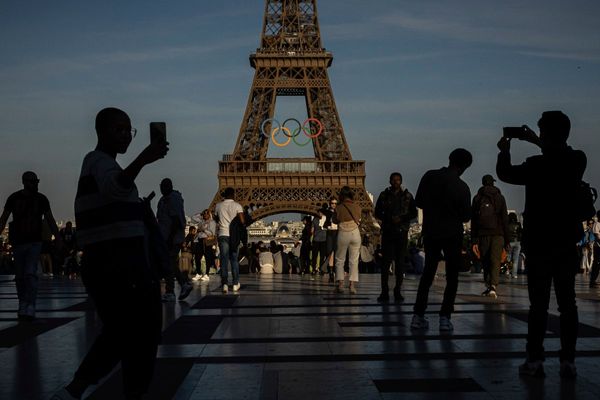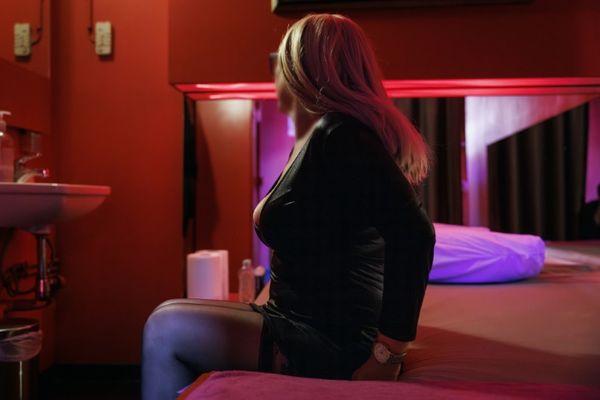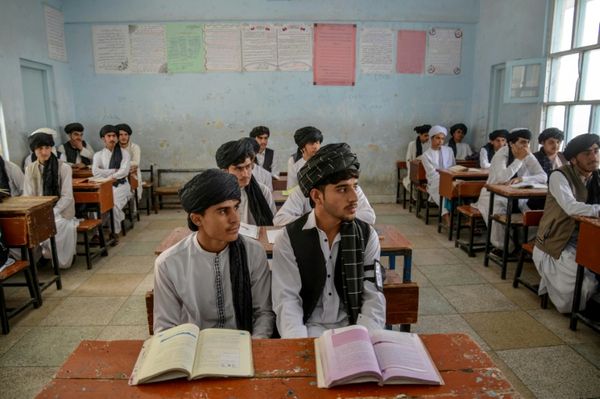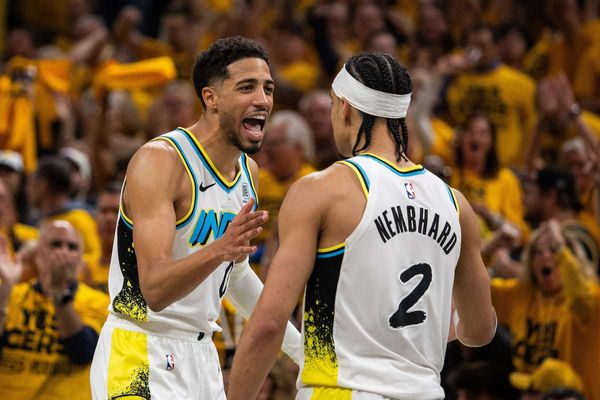
Wolf Hall: The Mirror and the Light (BBC One) | iPlayer
Bad Sisters (Apple TV+)
Immigration: How British Politics Failed (BBC Two) | iPlayer
The Penguin (Sky Atlantic/ Now)
I ’m a huge fan of Hilary Mantel’s double Booker prize-winning Wolf Hall trilogy, and was frustrated and unimpressed by BBC Two’s 2015 dramatisation of the first two novels, Wolf Hall and Bring Up the Bodies. Starring Mark Rylance as Henry VIII’s lowborn fixer, Thomas Cromwell, director Peter Kosminsky’s Bafta-winning adaptation felt as sluggish and laboured as Mantel’s writing was vivid and exciting. The series did ignite about two-thirds in, as Anne Boleyn (played with raw magnificence by Claire Foy) succumbed to trumped-up charges of treason, culminating in the unbearable, wind-lashed scenes of her beheading.
Almost a decade later we’re plunged back into those terrible final moments in the opening episode of Wolf Hall: The Mirror and the Light, based on Mantel’s concluding novel and again directed by Kosminsky and written by Peter Straughan. Here, Anne’s execution is intercut with Henry preparing for marriage to Jane Seymour (Kate Phillips) – the all-time king of toxic masculinity shrugging on weighty regalia and getting his beard trimmed in his latest bid for a legitimate male heir.
“Such freshness, such delicacy,” he purrs of his wedding night to a guilt-ridden but carefully impassive Cromwell, who is rewarded by being made Lord Privy Seal. Alone, Cromwell is frequently visited by the ghost of his former master and true significant other, Cardinal Wolsey (Jonathan Pryce), who will soon remind him of Henry’s lethal caprice: “When fortune turns against you, you will feel the lash.”
I suppose spoilers don’t count here; history contains all of those. Bar a few stodgy lulls, from the two episodes (of six) I’ve seen, this second series crackles with tension, driving forward the busy plot points: succession, ambition, peril, absolutism, religious turmoil, omnipresent female powerlessness and fear.
Cromwell now seems much more akin to the self-possessed but uncompromising attack dog of the books. It also helps enormously to be able to see what’s happening; at times, the first series looked as if it had been filmed inside a candlelit Tudor duvet cover. Cast changes, such as Timothy Spall replacing the late Bernard Hill as the Duke of Norfolk, work well, while Lilit Lesser is dynamite as Catherine of Aragon’s daughter, Lady Mary.
Then there’s Damian Lewis. The role of Henry is tricky: easy to collapse into cosplay caricature. It doesn’t matter (to me, anyway) that the actor doesn’t look as if he reeks of Henry’s regal gout; it matters that he’s impulsive, mercurial, spoiled, shallow and petrifying, whether being applauded at masked balls by lickspittles or silkily glaring at Cromwell as, finally, the blacksmith’s son blunders into a huge mistake. Lewis is outstanding throughout.
I was concerned about the second series of the jet-black comedy Bad Sisters (Apple TV+). Could it be as compelling without Claes Bang as swaggering smoothie baddie John Paul, who was – spoiler klaxon – offed, after many demented attempts by the bickering Garvey sisters, trying to protect their sibling (his wife) Grace (Anne-Marie Duff). While the original Bad Sisters – adapted by Sharon Horgan, Dave Finkel and Brett Bauer from the Flemish series Clan – was meant as a standalone story, in season two, Horgan creates a new mystery and also writes some episodes.
Early blissful scenes of Grace emerging, butterfly-like, from long-term abuse to marry new love Ian (Owen McDonnell) soon give way to the discovery of a corpse, chaos, desperation, police questioning, terrible tragedy and more for her sisters – played by Horgan (bossy Eva, who has a “menopause coach”), Eve Hewson (chaotic Becka, who performs a “nervous wee”), Eva Birthistle (perma-stressed medic Ursula) and Sarah Greene (foxy, eyepatch-sporting Bibi).
The plot becomes a little mangled, and while there are funny lines (“I love incense: it’s how I imagine Jesus smelled”), there are fewer than in the first series. That said, the ensemble playing remains pitch-perfect, and sweetly desperate neighbour Roger (Michael Smiley) is given a malevolent nosy churchwoman sister, Angelica, played with witchy naughtiness by Fiona Shaw. Yes, the suave horror of John Paul is missed, but over the course of eight episodes there’s still much to savour.
New two-part BBC Two docuseries Immigration: How British Politics Failed is to be commended for tackling such a difficult subject, but it also proves the impossibility of having a coherent, intelligent national debate on the matter.
Winding back to the early 00s, it’s interesting. Tony Blair talks about the migrant argument for economic growth. There’s an in-depth breakdown of major decisions and mistakes. There’s also a broad range of interviewees, including Andrew Green, whose Migration Watch thinktank produced data and analysis that David Cameron says proved “helpful” to the Conservatives.
Unfortunately, every so often Nigel Farage bursts in, doing his Brexit panto routine. Early on he blares: “At least Tony Blair was honest. He said: We’re going to open the doors to the whole world.” (Yawn! Blair didn’t say that.) In next week’s episode, Farage says with ill-disguised relish: “Just you watch, this issue is going to get bigger and bigger.”
Is his rather predictable input needed in all such documentaries? Couldn’t there just be a blank screen saying: “Please insert your own Nigel Farage bit here”? I’m not suggesting banning him (perish the thought!) – just giving him a wee rest on the topic of immigration. We can all agree he’s earned it.
On Sky Atlantic, Lauren LeFranc’s The Penguin, an eight-part TV-spin-off from 2022 film The Batman, concluded with the visceral virtuosity that, despite occasional slides into cheesy franchisedom, has made this the year’s most unexpected triumph. I won’t disclose the jaw-dropping and devastating late twist. I can reveal (lesser spoiler alert) that in the closing seconds, a bat logo appears in the sky above Gotham.
One of The Penguin’s secrets has been its committed story arc: it didn’t act like it had umpteen series to make a point. Nor was Oswald “Penguin” Cobb (Colin Farrell) played as a joke, but as an intimidating mobster, a charismatic leader, who wears his ugliness on the inside yet still has some to spare on the outside. Farrell’s achievement is that you forget he’s larded in a veritable acreage of prosthetics. You just remember his performance, and it’s staggering.
Star ratings (out of five)
Wolf Hall: The Mirror and the Light ★★★★
Bad Sisters ★★★★
Immigration: How British Politics Failed ★★★
The Penguin ★★★★
What else I’m watching
Sprint
(Netflix)
The return of the fascinating fly-on-the-wall documentary about international sprinters – among them the irrepressible US champion Noah Lyles. This time, we follow the athletes to the 2024 Paris Olympics.
Cross
(Amazon Prime Video)
A stylish, moody take on the hero of James Patterson crime novels, starring Aldis Hodge as the eponymous Washington DC detective.
Boybands Forever
(BBC Two)
It’s chart positions, trash talking and baby-oiled pectorals at dawn in this docuseries about boyband rivalries from the 1990s and 00s. In the double episode opener, the beef is between Take That and East 17.







